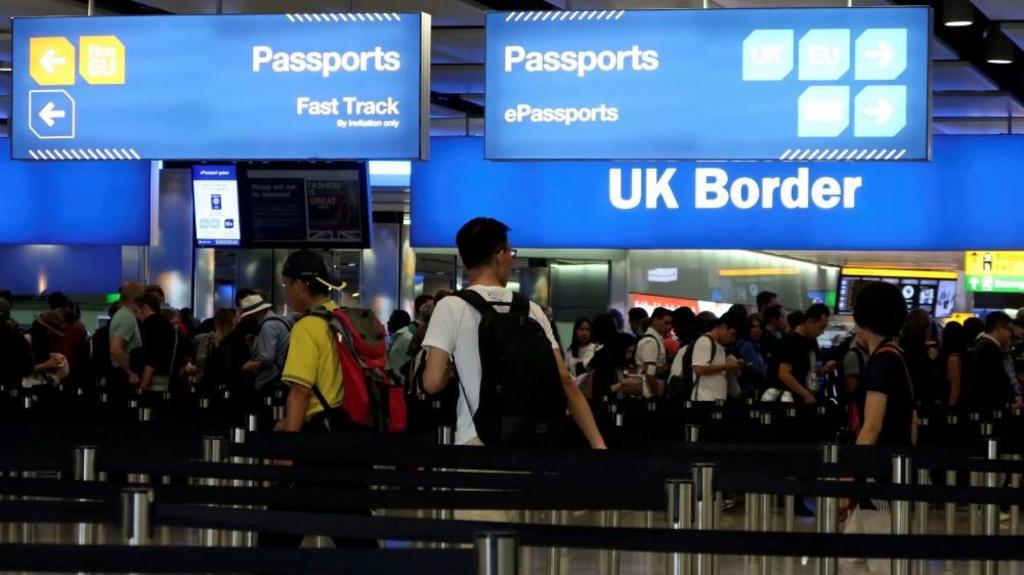“`html
The UK government is set to introduce stricter English language requirements for certain migrants, mandating proficiency equivalent to A-level standard.
These changes, scheduled to take effect on January 8, 2026, will apply to some graduates and applicants for Skilled Worker and Scale-up visas, the latter designed for individuals employed by rapidly expanding businesses.
The revised regulations are a component of broader initiatives, as outlined in a May white paper, aimed at reducing overall immigration to the UK.
Home Secretary Shabana Mahmood stated: “If you come to this country, you must learn our language and play your part.”
“This country has always welcomed those who come to this country and contribute,” Mahmood affirmed.
“But it is unacceptable for migrants to come here without learning our language, unable to contribute to our national life.”
Applicants will undergo in-person assessments of their speaking, listening, reading, and writing abilities at approved Home Office testing centers, with the results verified as part of the visa application process.
Those seeking Skilled Worker, Scale-up, and High Potential Individual (HPI) visas will be required to demonstrate English language skills at the B2 level, an increase from the current B1 standard, which is comparable to GCSE.
To qualify for the Skilled Worker visa, migrants must be employed by a government-approved employer and earn a minimum of £41,700 annually, or the prevailing “going rate” for their profession, whichever is higher.
The Scale-up visa is available to migrants joining fast-growing UK businesses. The HPI visa caters to individuals who have obtained a qualification from a leading global university within the past five years.
According to the British Council, an organization offering English language courses, individuals at the B2 level can “understand the main ideas of complex texts on concrete or abstract topics.”
They are able to express themselves “fluently and spontaneously” and engage comfortably in conversation with other English speakers. Furthermore, they can produce “clear, detailed text on many subjects and explain a complex viewpoint”.
Home Office Minister Mike Tapp informed Parliament on Tuesday that additional English language requirements for other visa routes and family dependents are expected to be introduced in due course.
The Prime Minister has previously stated that the reforms outlined in the white paper will ensure the UK’s immigration system is “controlled, selective and fair”.
Home Office estimates suggest the measures could reduce annual immigration to the UK by up to 100,000 individuals.
Net migration to the UK – the difference between total permanent arrivals and total permanent departures – decreased to 431,000 in 2024, a near 50% reduction compared to 2023, which saw a record high of 906,000.
Dr. Madeleine Sumption, director of the Migration Observatory at the University of Oxford, noted that the government faces a “trade-off” between “ensuring migrants speak good English and enabling employers to recruit workers who are expected to bring economic benefits.”
She added that many graduate positions already necessitate language skills exceeding A-level proficiency.
The new language standards are expected to have a “more impact in middle-skilled jobs involving technical and manual skills, where employers sometimes do not require high language proficiency”.
Immigration lawyer Afsana Akhtar told BBC News she considered it “unfair” to require migrants to achieve such a high level of English, “because even many people in the UK probably wouldn’t be able to pass English A-level”.
“This would rule out even skilled workers who want to come and contribute to our British economy,” she said.
“The GCSE standard is sufficient – and then when they come live here, [and] integrate into England and the English way of life, their English will improve inevitably.”
Other measures included in the white paper involve reducing the post-study period for international students to find graduate employment from two years to 18 months, effective January 2027.
Students will also be subject to increased financial requirements, raised to £1,171 per month outside London (from £1,136) for up to nine months.
The Global Talent visa, designed for high achievers in technology, arts, and academia, has also been broadened to encompass winners of a wider range of prestigious awards.
Additional proposals in the White Paper include an increase to the immigration skills charge UK employers must pay when sponsoring foreign workers on specific visas. This charge will rise to £480 per person per year for small organizations or charities, and to £1,320 for medium and large organizations.
These figures represent an increase from the previous rates of £364 and £1,000, respectively.
As part of the government’s ongoing efforts to attract highly skilled individuals to the country, the HPI route will be expanded. The number of migrants admitted under this visa is projected to double from 2,000 to 4,000, subject to an annual cap of 8,000 applications.
The Council of Europe’s human rights commissioner warns the government about policing of demonstrations.
The raid at the unnamed site was carried out by about 10 officers acting on intelligence.
The recent removals involved larger groups of migrants than previous flights, the Home Office says.
Harlow Council claimed asylum seekers were planned to be housed in the town centre.
Asylum seekers and charities tell BBC of “terrible” conditions as accommodation provider makes millions.
“`

